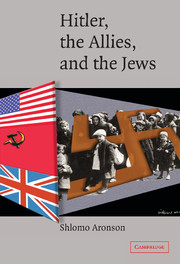Book contents
- Frontmatter
- Contents
- Preface
- Acknowledgments
- List of Abbreviations
- PART I THE MAKING OF THE MULTIPLE TRAP
- 1 The Phases 1933–1939: The Initial and the Double Trap
- 2 Western Responses
- 3 A Flashback on the Palestine Question
- 4 1939 to “Barbarossa” – The Foundation of the Multiple Trap
- 5 The “Final Solution” Decision and Its Initial Implementation
- 6 The “Final Solution” in Some Detail and More on Its Justification
- 7 The Zionists' Dilemmas
- 8 Dimensions of the Allied Response to Hitler's “Jewish Politics” and the Deepening of the Trap
- 9 The War Priorities of the Western Allies and Rules of Economic Warfare Related to the Holocaust, 1941–1944
- PART II THE RESCUE DEBATE, THE MACRO PICTURE, AND THE INTELLIGENCE SERVICES
- PART III THE SELF-DEFEATING MECHANISM OF THE RESCUE EFFORTS
- PART IV THE BRAND–GROSZ MISSIONS WITHIN THE LARGER PICTURE OF THE WAR AND THEIR RAMIFICATIONS
- PART V THE END OF THE FINAL SOLUTION: BACK TO HOSTAGE-TAKING TACTICS
- Epilogue: Self-Traps: The OSS and Kasztner at Nuremberg
- Notes on Sources
- Selected Bibliography
- Index
3 - A Flashback on the Palestine Question
Published online by Cambridge University Press: 22 July 2009
- Frontmatter
- Contents
- Preface
- Acknowledgments
- List of Abbreviations
- PART I THE MAKING OF THE MULTIPLE TRAP
- 1 The Phases 1933–1939: The Initial and the Double Trap
- 2 Western Responses
- 3 A Flashback on the Palestine Question
- 4 1939 to “Barbarossa” – The Foundation of the Multiple Trap
- 5 The “Final Solution” Decision and Its Initial Implementation
- 6 The “Final Solution” in Some Detail and More on Its Justification
- 7 The Zionists' Dilemmas
- 8 Dimensions of the Allied Response to Hitler's “Jewish Politics” and the Deepening of the Trap
- 9 The War Priorities of the Western Allies and Rules of Economic Warfare Related to the Holocaust, 1941–1944
- PART II THE RESCUE DEBATE, THE MACRO PICTURE, AND THE INTELLIGENCE SERVICES
- PART III THE SELF-DEFEATING MECHANISM OF THE RESCUE EFFORTS
- PART IV THE BRAND–GROSZ MISSIONS WITHIN THE LARGER PICTURE OF THE WAR AND THEIR RAMIFICATIONS
- PART V THE END OF THE FINAL SOLUTION: BACK TO HOSTAGE-TAKING TACTICS
- Epilogue: Self-Traps: The OSS and Kasztner at Nuremberg
- Notes on Sources
- Selected Bibliography
- Index
Summary
The role of Palestine and Zionism, of Arab reaction to the latter, and Allied behavior in this regard should now be outlined in a historical perspective that goes back to the origins of the British official statement of policy known as the “White Paper” on Palestine of May 1939, which in fact reversed British obligations toward the Jews in favor of the Arabs; in order to understand this reversal, a look back to the mid-1930s and to the Arab rebellion in British Palestine between 1936 and 1939 is required.
The rebellion was not only the result of the growing Jewish immigration to British Palestine caused by Hitler and by the rise of Fascism elsewhere in Europe but also the result of a German–Italian challenge to the supremacy of the Anglo-French in the Middle East, which seemed to some Arab nationalists to be an alternative to British direct or indirect rule.
According to Bernard Lewis, the German model of unification and transformation of separate entities into a mighty Reich had earlier been a source of inspiration to Arab nationalists, who could not adopt the British or the French forms of domestic liberalism and democracy and resented their imperial rule. Another option would have been American support for the Arab cause, the Americans having no colonial or imperialist interests in the region. This was pursued by the Palestinian scholar and statesman George Antonius and his Catholic mentor Charles Crane.
Information
- Type
- Chapter
- Information
- Hitler, the Allies, and the Jews , pp. 17 - 21Publisher: Cambridge University PressPrint publication year: 2004
